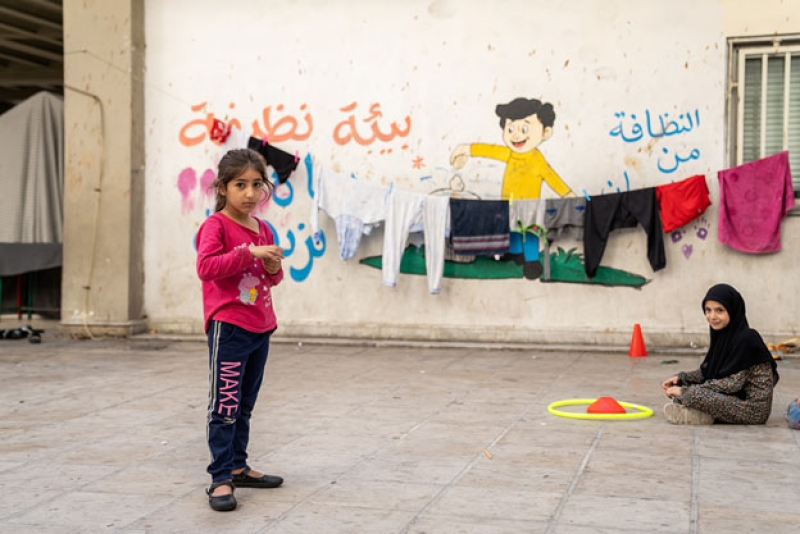- BSF halts fencing at Joypurhat border after BGB intervention |
- 30 NCP leaders urge Nahid Islam not to form alliance with Jamaat |
- Tarique offers fateha at graves of Pilkhana martyrs, father-in-law |
- Navy detains 11 over smuggling diesel, cement to Myanmar |
- Investors stay away as stocks turnover drops 7% despite index gains |
Israel-Lebanon Ceasefire Uncertain Amid Repeated Violations

Two Lebanese children residing in a school-turned-shelter in Beirut following an escalation of hostilities in Lebanon. Credit- UNICEF-Fouad Choufany
By Oritro Karim
UNITED NATIONS, Dec 4 2024 (IPS) - On November 27, Israel, Lebanon, and a host of mediating states agreed upon a ceasefire agreement that would establish a permanent cessation of warfare between the two parties. As of December 3, there have been no reported instances of Hezbollah directing attacks toward Israel that resulted in any casualties. Despite this, there have been numerous reported violations committed by Israel, causing extensive harm to civilian lives and local infrastructure. Many parties have warned for the international community to hold Israel accountable for these violations.
The ceasefire agreement mandates both Israel and Hezbollah withdraw their forces from each other’s territories and report any and all violations of peace to the United Nations Interim Force in Lebanon (UNIFIL) and the committee of mediating nations. Israel has been given a 60-day period to retreat the entirety of its troops from southern Lebanon, while Hezbollah must withdraw its forces north of the Litani River.
According to a December 1 report released by the Office for the Coordination of Humanitarian Affairs (OCHA), 578,641 internally displaced persons began moving back to their place of origin in Lebanon. It is also stated that further airstrikes and military restrictions imposed by the Israeli Defense Forces (IDF) have left many unable to return to their communities.
The Euro-Mediterranean Human Rights Monitor issued a press release on December 2, reporting that Israel had violated the terms of the agreement at least 18 times in southern Lebanon alone. As of December 1, there have been 62 reported violations committed by Israel that have targeted civilians and infrastructure in Lebanon. It’s been reported that Lebanese civilians were killed through the IDF opening fire on them and commanding drone strikes. Additionally, the IDF have issued further restrictions of movement south of the Litani River.
December 2 marked the deadliest day of hostilities in Lebanon since the ceasefire came into effect. It began when Hezbollah launched two projectiles toward Israel, responding to a series of violations committed by Israel over the past week. The attack, described as a “defensive warning strike”, landed in an open area and caused no injuries.
In a statement posted to X (formerly known as Twitter), Israeli Prime Minister Benjamin Netanyahu confirmed plans to retaliate against Hezbollah, describing the attack as “a serious violation of the ceasefire”, adding that Israel will “respond to any violation by Hezbollah-minor or serious.”
Israeli Minister of Military Affairs Israel Katz urged Lebanon to uphold their conditions of the ceasefire. “If the ceasefire collapses, there will be no more exemption for the state of Lebanon. We will enforce the agreement with maximum impact and zero tolerance. If until now we have differentiated between Lebanon and Hezbollah, that will no longer be the case,” Katz said. He did not address Israel’s numerous reported violations.
The IDF responded by launching a series of strikes on two southern Lebanese towns, Talousa and Haris, killing at least eleven civilians and causing considerable damage to local infrastructure.
In a statement issued on X, the IDF stated that they struck Hezbollah terrorists, dozens of launchers, and terrorist infrastructure throughout Lebanon in response to several acts by Hezbollah in Lebanon that posed a threat to Israeli civilians, in violation of the understandings between Israel and Lebanon They added that the state of Israel remains allegiant to the conditions laid out in the ceasefire agreement but will continue to defend itself.
Israeli Foreign Minister Gideon Saar denied Israel’s reported violations of the agreement, adding that Israel would “not accept a return to the situation as it stood [prior to the escalation of hostilities].” French Foreign Minster Jean-Noël Barrot was reported speaking to Saar over a phone call noting that it was urgent “for all sides to respect the ceasefire in Lebanon”.
Despite this, the Biden administration has expressed concern that the “fragile” ceasefire agreement might unravel due to repeated violations of the agreement. Israeli public broadcaster Kan reported that the U.S. envoy Amos Hochstein issued a warning to Israel over its ongoing violations.
An Israeli official informed news publications that Hochstein believes that Israel is enforcing the ceasefire “too aggressively”. Hochstein also reportedly expressed uncertainty over the endurance of the ceasefire, opining that the situation is dependent on how Hezbollah responds to the recent attacks.
Officials from the United States have confirmed that despite sporadic strikes from both sides of the border, they remain confident that the ceasefire agreement will not waver.
U.S. State Department spokesperson Matthew Miller told reporters; “Obviously, when you have any ceasefire, you can see violations of it. Broadly speaking, it is our assessment that despite some of these incidents that we are seeing, the ceasefire is holding.” White House spokesperson John Kirby added that “there has been a dramatic reduction in the violence. The monitoring mechanism is in full force and is working”.
IPS UN Bureau Report

